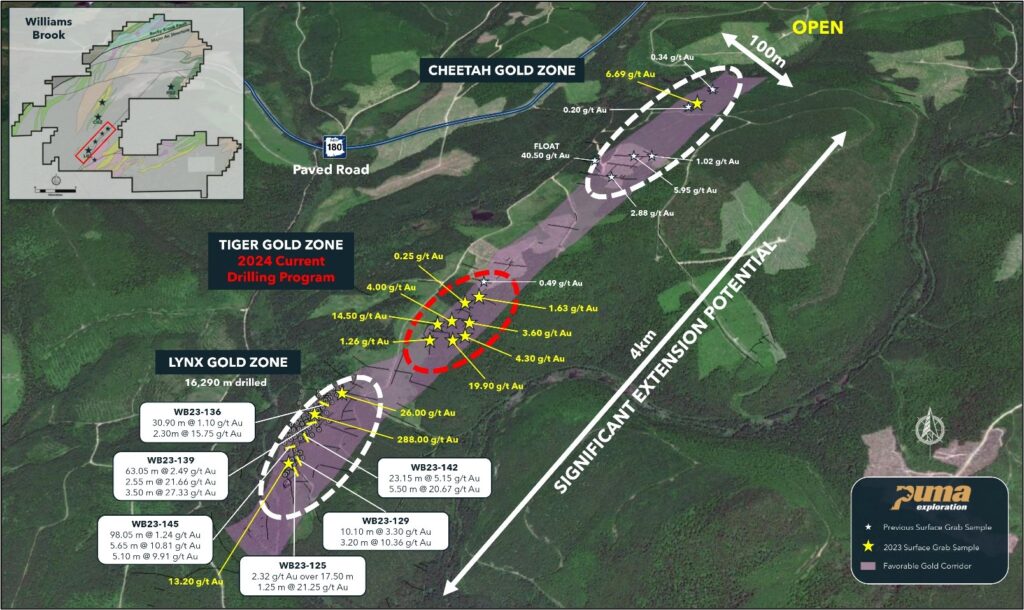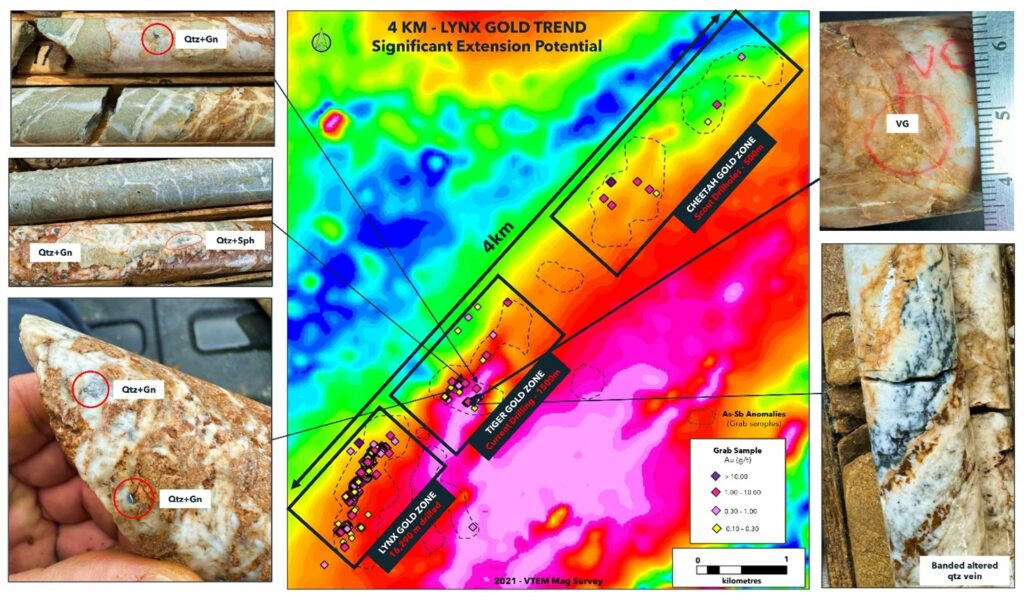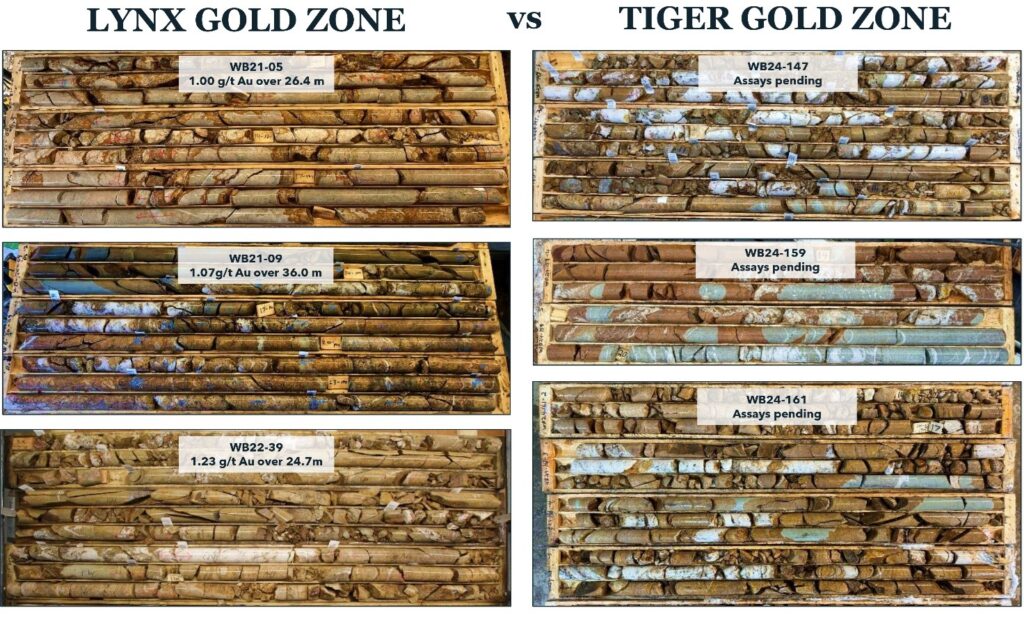Rimouski, April 4, 2024 – Puma Exploration Inc. (TSXV: PUMA, OTCQB: PUMXF) (the “Company” or “Puma”) is pleased to provide an update on the ongoing 2,000 metres drilling program at the Tiger Gold Zone (“TGZ”) at its 100% owned Williams Brook Gold Project in Northern New Brunswick. The Tiger Gold Zone is a new gold area discovered last year by applying the Company’s successful discovery model. Positive initial drill core observations prompted the expansion of the program.
Drilling Highlights
- Fifteen (15) holes with depths from 25 to 150 m have been completed for a total of 875 metres.
- The holes were drilled 425 metres from the Lynx Gold Zone (Figure 1).
- All holes intersected the targeted favourable gold-bearing horizon of quartz veins / stockwork in altered sediment and gabbro units.
- Visible gold was observed in hole WB24-151 in a quartz vein in altered gabbro (Figure 2).
- The same pervasive alteration corridor characteristic of the LGZ is observed at Tiger (Figure 3).
‘We are thrilled with what we see in the first 800 metres drilled so far at Tiger. The core exhibits the same pervasive alteration and mineralization characteristic of the Lynx Gold Zone. This further supports our belief that we are dealing with a large gold system and that the Lynx Gold Zone extends at least 1.5 kilometres along strike. Following these observations, we have expanded our drilling program by adding scouting drill holes along another 2-kilometre extension. With our exploration program fully funded, our focus is to grow the scale and resource along the Lynx Gold Trend in 2024‘’ stated Marcel Robillard, President and CEO of Puma.
2024 Expanded drilling program at the Tiger Gold Zone
The inaugural drilling program at TGZ aims to prove the 1.5 km northeast extension of the pervasive gold corridor of the Lynx Gold Zone (‘’LGZ’’) (Figure 1) and demonstrate a potential width increase. The shallow fan-patterned drilling is testing the mineralization below the gold veins, identified by trenching and mapping last year. Drilling also aims to understand what controls gold mineralization at the TGZ and how this zone fits our current structural and geology model.
Figure 1. Gold zones along the Lynx Gold Trend (LGT)

The reader is cautioned that grab samples are selective by nature and may not represent the true metal content of the mineralized zone.
Geophysics and geochemical surveys previously identified a series of targets along the Lynx Gold Trend, which were followed up by limited trenching by previous operators. Last year, Puma discovered a new prospective area, the Cheetah Gold Zone (“CHGZ”), which returned 6.69 g/t Au in the Company’s initial trenching and sampling exploration program.
‘We are so excited and encouraged about what we see in the core at Tiger that we decided to test the favourable contact along another 2 km. We’ll be drilling step-out shallow holes along the Lynx Gold Trend to test the presence of gold mineralization up to 4 km away from Lynx. This preliminary scouting drilling and continued systematic surface exploration work will enable us to prove the surface extent of the mineralized zone. Our drilling at Tiger is showing that the system extends at least 1.5 km along strike and we’ll continue to successfully extend the zone with our tried and true exploration methods,“ said Rejean Gosselin, geologist and Puma’s Executive Chairman.
Figure 2. VTEM mag survey with core drilled at the Tiger Gold Zone

Figure 3. Visual comparison of core from the Lynx and Tiger Gold Zones

More about the Tiger Gold Zone (“TGZ”)
In 2023, surface exploration work along the Lynx Gold Trend expanded the TGZ, located 350 m away from the LGZ, thereby confirming the presence of gold mineralization at surface over more than 1.5 km along strike. Four (4) sizeable mineralized quartz veins-oriented W-NW discovered at the TGZ returned significant high-grade gold results, including 19.90 g/t gold and 14.50 g/t gold, and confirmed that high-grade gold mineralization is continuous within the pervasive hydrothermal alteration corridor seen at surface. The current program confirms that surface gold mineralization and the favourable corridor extends and is open to depth.
The Tiger Gold Zone area now spans 400 m by 180 m. The gold mineralization occurs in quartz veins (typically drusy to massive) with minor carbonate and sulphides such as chalcopyrite, sphalerite, galena, and malachite typical of the high-grade veins discovered at the Lynx Gold Zone (Figure 3). Pervasive sulphidation is observed within the quartz veins. As seen at the Lynx Gold Zone, the quartz veins occur at the contact between rocks of different competencies – volcanic and sediment units and a sizeable mafic unit.
About the Williams Brook Gold Project
Puma’s flagship Williams Brook Gold Project comprises four properties covering more than 49,000 ha in Northern New Brunswick, an established and mining-friendly jurisdiction near paved roads and excellent infrastructure. The land package is located near the Rocky Brook Millstream Fault (“RBMF”), a major regional structure formed during the Appalachian Orogeny and a significant control for gold deposition in the region.
Puma’s successful exploration model returned, amongst others, 5.50 g/t gold over 50.15 m in hole WB21-02 (see Sept.15, 2021, News Release), 2.77 g/t gold over 42.80 m in hole WB 22-66 (see June 8, 2022, News Release), 2.49 g/t gold over 63.05 m in WB23-139 (see Oct. 31, 2023 News Release), 5.15 g/t gold over 23.15 m in WB23-142 and 1.24 g/t gold over 98.05 m in WB23-145 (see Nov. 16, 2023 News Release).
Since 2021 and with less than C$12.5M of exploration investment. Puma has made multiple gold discoveries at the Williams Brook property and believes that the property hosts an extensive orogenic gold system. Puma’s ongoing exploration programs are focused on building a gold camp in Northern New Brunswick, Canada.
Dr. Gregg Morrison, a leading expert on intrusion-related, porphyry and epithermal gold systems, stated: “I believe Williams Brook is part of the same family of gold systems as Fosterville and Sunday Creek in Australia and Valentine Lake in Newfoundland. These other deposits are known for their structure-controlled mineralization, metal zoning, free gold in bonanza shoots and kilometre scale depth extent. The similarities to these more comprehensively explored deposits gives real confidence to deeper drilling in the Lynx Zone and continued exploration around the feeder structures in the Williams Brook District.’’
Upcoming Gold Investor Events
Puma invites shareholders and interested parties to stop by the booth, attend a presentation, or schedule a meeting at the upcoming conferences to discuss the Company’s recent news and proposed developments:
The Mining Investment Event of the North
Québec City, Québec
June 4-6, 2024
Qualified Person
The technical information in this release was reviewed and approved by Dominique Gagne, P.Geo, a consultant of Puma and a qualified person as defined by National Instrument 43-101—Standards of Disclosure for Mineral Projects.
On-Site Quality Assurance/Quality Control (“QA/QC”) Measures
Drill core and surface samples are bagged, sealed and sent to ALS CHEMEX in Moncton, New Brunswick, where each sample is crushed and pulped before being fire-assayed (Au-ICP21). The remaining coarse reject portions of the samples remain in storage for further work or verification as needed. As part of its QA/QC program, the Company inserts external gold standards (low to high grade) and blanks every 20 samples in addition to standards, blanks, and duplicates. All samples over 10 g/t gold or with abundant visible gold are analyzed with a gravity finish (Au-GRA22). Check assays are routinely performed for samples with visible gold to ascertain the gold content of the mineralization zone.
About Puma Exploration
Puma Exploration is a Canadian-based mineral exploration company with precious metals projects in New Brunswick, near Canada’s Famous Bathurst Mining Camp (“BMC”). Puma has a long history in Northern New Brunswick, having worked on regional projects for over 15 years. As a first mover, the Company quickly and strategically accumulated an impressive portfolio of prospective gold landholdings in the area. Puma’s successful exploration methodology combines old prospecting methods with detailed trenching and up-to-date technology such as Artificial Intelligence (“AI”) to facilitate an understanding of the geology and associated mineralized systems. Armed with geophysical surveys, geochemical data and consultants’ expertise, Puma has developed a perfect low-cost exploration tool to discover gold at shallow depths and maximize drilling results.
The Company is also committed to deploying its DEAR strategy (Development. Exploration. Acquisition. and Royalties) to generate maximum value for shareholders with low share dilution.
Connect with us on Facebook / X/ LinkedIn.
Visit www.explorationpuma.com for more information or contact:
Marcel Robillard. President and CEO. (418) 750-8510;
president@explorationpuma.com
Mia Boiridy. Head of Investor Relations and Corporate Development. (250) 575-3305;
mboiridy@explorationpuma.com
Neither the TSX Venture Exchange nor its Regulation Services Provider (as that term is defined in the policies of the TSX Venture Exchange) accepts responsibility for the adequacy or accuracy of this release.
Forward-Looking Statements: This press release may contain forward-looking statements. Such forward-looking statements involve several known and unknown risks, uncertainties, and other factors that may cause the actual results, performance, or achievements of Puma to be materially different from actual future results and achievements expressed or implied by such forward-looking statements. Readers are cautioned not to place undue reliance on these forward-looking statements, which speak only as of the date the statements were made, except as required by law. Puma undertakes no obligation to publicly update or revise any forward-looking statements. The quarterly and annual reports and the documents submitted to the securities administration describe these risks and uncertainties.